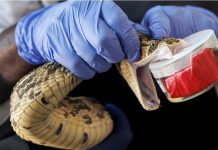Africa-Press – Botswana. Botswana’s agricultural sector, primarily driven by a robust beef industry, is set to enhance its collaboration with Zambia in the field of livestock and production.
This was said by Minister of Agriculture, Mr Fidelis Molao during the benchmarking visit by Zambia’s Provincial Minister of Livestock and Fisheries for Southern Province, Mr Credo Nanjuwa and his entourage on Tuesday. He highlighted that beef production emerges from both commercial and communal farming systems, with the latter accounting for about 80 per cent of the country’s beef supply.
“However, this communal system is not yet performing to our desired level, with most performance indicators continuing to be unsatisfactory,” Mr Molao said
The five-day visit is meant to strengthen bilateral cooperation between Botswana and Zambia in the field of livestock and production. By sharing knowledge, expertise and resources, Mr Molao said Botswana and Zambia could work together to combat livestock diseases, improve the health of livestock, and ultimately enhance the economic prosperity of both countries.
“Our collaboration is expected to give the two countries an opportunity to use their existing strengths to complement each other, so as to expand their horizon and impact, in the field of agriculture and livestock, including aquaculture and apiculture,” he said. To reverse the misfortunes of the industry, Mr Molao said a comprehensive beef cluster strategy was being implemented to position Botswana beef as a unique product that would remain attractive in the global niche markets. Mr Molao said a decision had been taken to liberalise Botswana beef export market.
“To ensure that the superior status of the industry is maintained, a law has been passed that regulates the livestock industry, the Meat Industry Regulatory Act, which has led to the establishment of a regulatory body called the Meat Industry Regulatory Authority (MIRA),” said the minister.
Additionally, Mr Molao said a state of the art facility was also being set up at Ramatlabama Artificial Insemination camp, for Assisted Reproductive Technologies, to allow the country to export cattle and small stock semen and embryos, noting that the plan was to also have the facility accredited as a centre of excellence. To enhance the genetics of local animals and increase livestock numbers, Minister Molao said government had imported superior genetic materials from the United States of America, France and Australia. “There is no doubt that Zambia will benefit from these initiatives. In fact, we have already received a request by the Zambian government to procure live breeding cattle from Botswana, as well as semen. Teams from both countries are working together to ensure that this transaction is concluded soon,” he added.
Besides beef cattle production and development, the country also promotes other livestock species, such as sheep, goats, piggery and ostriches, Minister Molao said.
He said Botswana stood to benefit a lot from Zambia’s prowess in the field of aquaculture and fisheries. Minister Molao said Zambia had an advanced irrigation programme that Botswana could learn from, to mitigate the effects of climate change.
“We want to note with appreciation that Zambia continues to be one of our major suppliers of livestock feeds, mainly maize Stover, bran and molasses. Our relationship is, therefore, symbiotic, and I envision a situation where the two countries work together in even taking advantage of investment opportunities that arise,” he added.
The minister said Botswana was the best partner for Zambia, particularly in the development of the livestock sector, since the country had invested significantly in an animal health system underpinned by zoning, animal traceability and a veterinary public health system that had enabled the country to sustain access to high value markets including the European Union.
Further, he said Botswana Vaccine Institute (BVI) had also been instrumental in the production of high-quality fit for purpose livestock vaccines, such as Foot and Mouth Disease (FMD) vaccine adding that the institute vaccines were not only used within Southern Africa, but benefitted East and West Africa as well.
He appreciated Zambia as one of Botswana’s prime customers for the BVI vaccines.
To promote research and development in agriculture, the minister said government established a National Agricultural Research and Development Institute (NARDI) to facilitate commercialisation and adoption of technologies, which had been lagging behind.
Minister Nanjuwa, who is also head of the delegation, said Zambia was greatly impressed by Botswana’s commitment to quality, safety and sustainability in the agriculture sector and said the benchmarking visit was aimed at understanding Botswana’s value chain, from breeding to export, learning about the country’s regulatory frameworks, disease control measures and quality assurance systems.
Other objectives of the visit include to explore potential areas for collaboration, trade and investment, exposure on how to increase quality beef production for the export market, learn how to improve forage and fodder availability for feeding beef cattle at different production stages and to learn how to enhance rangeland management health and resilience, Mr Nanjuwa said.
“We are more than willing and ready to share with you some of our natural resources that will enhance your livestock industry. These include grasses, pasture, maize, bread and soybeans,” he added.
While in Botswana, the Zambian delegation is expected to visit the Brands facilities, Botswana Animal Information and Traceability System facilities, BVI, Botswana Meat Commission, Botswana Agricultural Marketing Board, NARDI and Botswana University of Agriculture and natural Resources and also have a meeting with Botswana National Beef Production Union.
For More News And Analysis About Botswana Follow Africa-Press






